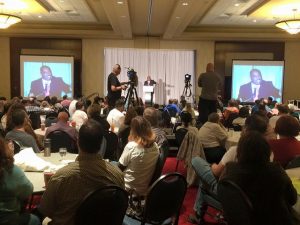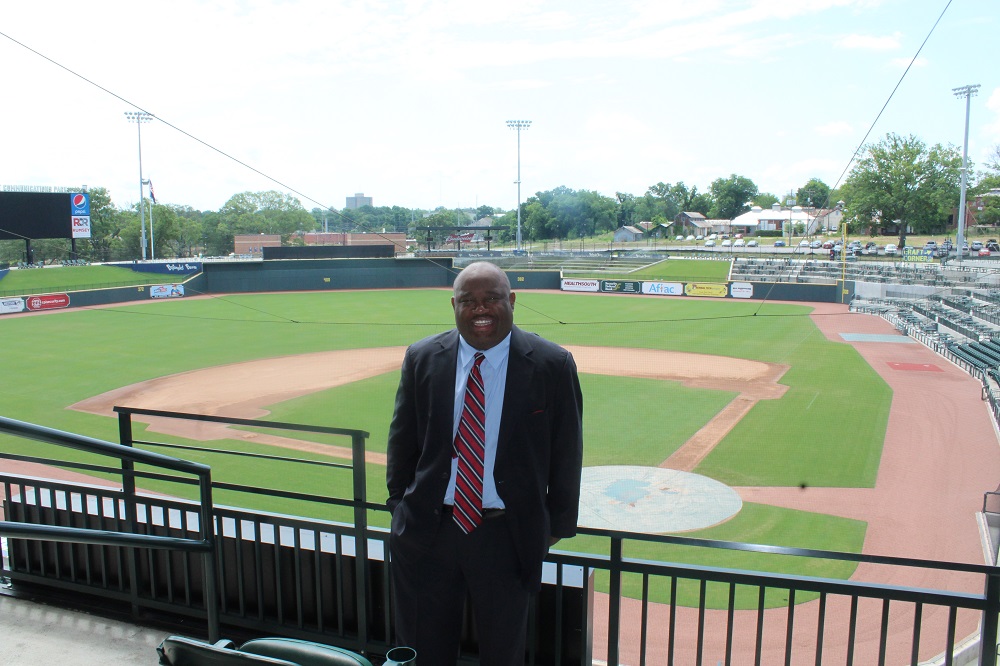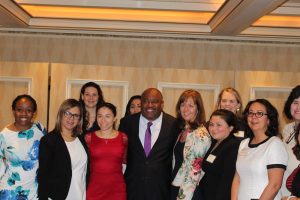This above photo is a great recent day I had as the keynote at a South Carolina Conference. It was held at the Spirit Communications Park in Columbia where the minor league baseball team plays.
With my upbringing, my childhood, I never ever wanted to cry. I was afraid of the unknown, feeling strongly if the emotional floodgates ever opened up, the tears would never stop. I feared that a full and complete nervous breakdown would be the next step. Yes this is the same guy that has covered politics on New York television and radio for the last 30 years. Journalism is one hat that I wear.
Last month I turned 54 years of age, and I firmly feel that I have finally stopped running from myself.
I was a victim of severe Child Abuse, even childhood sexual abuse, and as a toddler even placed in the New York City Foster Care System.
Can one recover from Child Abuse? The answer is yes, but it is a life long struggle.
That is something that I just learned from a very wise person, Mary Louise (Measi) O’Rourke. Mrs. O’Rourke is the Founder and Executive Director of the Saint Joseph Parenting Center in Stamford Connecticut. I served as their keynote speaker in April of this year, and here are some photos. Measi O’ Rourke is to my immediate right in the photo below.
Dominic Carter with members of the St. Joseph Parenting Center in Connecticut. April 2018
I strongly believe with all my heart that professionals that work in the field of Child Abuse Prevention, Foster Care, Foster Care parents, etc….and the list goes on, really are as I wrote in the pages of the Huffington Post, “Angels on Earth.” They saved my life. I can never repay them, but I can say thank you, thank you, thank you, and I try to give back by helping other young people.
I travel the country a lot these days as a public speaker, discussing aspects of my life that at one time I thought I would take such “secrets” to the grave, but let me tell you, the burden of having “secrets” can kill you. I advise you, and anyone reading this, that if you have “secrets,” discuss them with a counselor, discuss them with someone professionally because it is one of the worst feelings in the world. I speak from experience.
By discussing my secrets, it was the only way I was able to come to terms with my mother, and it was only once that I truly forgave my mother, that I felt like 800 pounds had been lifted off of my chest.
As I say in speeches all across the country, my mother was as much a victim as I was. She (Laverne Carter) was diagnosed with severe Mental Illness, “Chronic Paranoid Schizophrenia.” At age 16 she was receiving electrical shock and having straitjackets placed on her against her will. Two short years later, I would enter the world.
But God has a way of being the great equalizer. My mother didn’t have a voice in society’s eyes, but God made sure her son did. That is why I went into Journalism. To be a voice for the voiceless. I stand by championing those with no political power thirty years later.
I don’t have a father. These days they call the phenomenon “Single-parent households,” but it has been my life for all of my 54 years. When I look at my upbringing, that also includes the fact that no man ever cared enough to even sign my birth certificate, there are times when I’m sad . But nothing, and I mean nothing replaces the maternal bond.
To say different would just be denial, and outright lying. At that Child Abuse conference just recently in Columbia South Carolina, the professionals there, taught me a tremendous lesson. In a power-point presentation, I showed some of my mother’s actual psychiatric records that indicated with one apparent outburst of my mother while she was institutionalized, the medical staff gave her 1500 milligrams of “Thorazine, ” and there were several loud gasps heard in the room from numerous people. I didn’t understand why, and several of the professionals at this South Carolina Conference told me, that dosage of Thorazine is so high that it could have killed my mother. That 1500 milligrams is way, way too much, AND WOULD NEVER BE DONE TODAY BY THE MEDICAL COMMUNITY.
I was so saddened to hear this information about the strong dosage of the medicine my mother was given standing in front of numerous people. She had to be so scared as a young woman.
Right now is one of those times that I want to cry, but I am so thankful for my life, and the tremendous journey I have had as a TV Journalist. I lay my entire life out in my book, titled: “No Momma’s Boy,” which Oprah Winfrey Profiled in her magazine. (Just Click Here for the Oprah article) I’m the type of person where I would not have done a book, unless I had something to say. You can order the book here.
That South Carolina conference was held in Columbia, June 14th, 2018. It was titled the Cultural & Linguistic Competency Summit 2018. You can click here to see some of the photos. Some of the main organizers were Family connection of South Carolina, and the South Carolina Joint Council on Children and Adolescents.
Another recent event I have been the keynote speaker was in the great state of Missouri before the Missouri Coalition for Community Behavioral Healthcare. April 12th in Jefferson City. The President/CEO Brent McGinty is an amazing leader. Katie Horstman is the remarkable training director, and a special thanks to organizer Marsha Morgan, a fantastic lady. Photos are here. I will also never ever forget the GREAT people of Kansas at KVC Health Systems. Thanks to Executive Vice President Renny Arensberg for being who she is, and for making the conference an amazing experience. A shout out also to CEO Jason Hooper, and the man he replaced Wayne Sims, (35 years of service) , and to Chief Operations Officer Erin Stucky.

The amazing folks of KVC Health Systems in Kansas. This speech was simulcast live to Kentucky, Nebraska, and West Virginia.
A cross to Bear
We all have our crosses to bear but I’m an optimist by nature. I have always been a “glass is half full,” as opposed to the “glass is half empty” type of person. Never give up, ever. One of the tough spots in my life is my son health. Dominic Jr. has epilepsy, and since he was an infant epilepsy has been part of our life, but you know what, we were told by education experts, because of his learning disability, Dominic could never graduate from high school. Epilepsy is a never ending battle, but I am deeply proud to tell you that not only did Dominic graduate from high school, but also from community college, and then with his four year degree in Communications, just like his dad. Perseverance, and tenacity are in all of us if you just tap into it.
So I was never the type of kid that was born on third base in life, and claims to have hit a home run.
I look back at my life, and I am just thankful for all the people that stepped up to give me a shot. An opportunity. That’s why attending my grandson’s pre-school graduation recently really meant the world to me.
I return and conclude with the South Carolina Conference. I think it is important to lay out the type of very important and relevant workshops that were held.
Workshop Descriptions
Homelessness: Implicit Bias: Impact on Decision-making – Rita Cameron-Wedding
This presentation is designed is adaptable for a multi-disciplinary audience including social worker and judges as well as practitioners from other youth serving systems, e.g., education, mental health and juvenile justice. The decisions made at any point along the decision-making continuum have the capacity to promote bias within judges using a multi-disciplinary focus this presentation describes how decisions informed by implicit bias in other youth serving systems, e.g., education, juvenile justice and mental health can effect decisions that fall within the purview of child welfare.
Much of the bias that occurs in public systems is unintentional. Even people who believe they treat everyone the same can discriminate in subtle but consequential ways. Bias reflected in language, attitudes and actions however slight could effect the application and interpretation of policies, procedures and the law in ways that contribute to racial disparities.
Recovering from the Shame, the Guilt, and the Embarrassment- Dominic Carter, Veteran Newsman, Mental Health Advocate, Child Sexual Abuse Survivor, Author, and Speaker
This presentation is about Dominic Carter’s triumphant struggle to overcome his mother’s Mental Illness but it is also a heart-wrenching journey of Childhood physical and sexual abuse. Dominic’s own biological mother sexually abused him. Dominic is a nationally known journalist, but he believed his life-long secrets were so horrendous and embarrassing that he would take them to his grave, vowing to never reveal them. Dominic will discuss his tremendous highs and devastating lows, and what makes him the successful journalist that he is today. By using his own life to illustrate his point, Dominic proves that while it may be difficult, the work of conference attendees here at the conference is saving lives. Dominic grow up on welfare in the housing projects of NYC, and never had a father. Dominic will talk about the deep pain of the fact that no man has ever signed his birth certificate, and detail how the only man in his life, was his grandfather, who was a heroin addict. Dominic Carter’s life of overcoming numerous obstacles in life was profiled by Oprah Winfrey, in her magazine.
Advancing Cultural Competence by Understanding Adverse Childhood Experiences- Allison E. Farrell, MPH, LISW-CP, ACM
In this session, participants will learn about the original Adverse Childhood Experiences (ACEs) Study and the link between childhood adversity and adult health outcomes. The session will cover neurobiology, brain development, individual and population level impact, and the important role of prevention in building resiliency. Participants will engage in discussions on the impact of ACEs and learn how to effectively work with children and families impacted with adversity.
Culture of Poverty- Its Influence on Success – Sheila Albergottie, LMSW
This interactive workshop will provide information and experiences to increase knowledge of the different types of poverty and how knowledge of the mental model of poverty will improve outcomes. The presenter will identify those factors and issues that influence a worker’s impact when working with customers in poverty and will review successful strategies as identified by Ruby K. Payne, PhD, in A Framework for Understanding Poverty that will enhance interventions.
Assessing Need for Interpreters and Working Collaboratively to Address Communication Needs among Families in a Clinical Setting – Roger Williams, LMSW, CT, QMHI-S, Director for Deaf Services, SCDMH
Working with an interpreter is both a challenge and an opportunity. The act of interpretation is more than a one-to-one translation of one language to another. It also requires cultural mediation and the ability to bridge two differing world views. If you are flexible, creative and open, you can gain new perspectives on not only your consumer and their linguistic community, but yourself and your other consumers. This workshop will provide a general overview of how and when to use interpreters within the clinical setting, as well as provide information about the unique dynamics and challenges which result. As has been observed many times “Something gets lost in the translation”. This workshop will demonstrate how something can also be gained.
LGBTQI Cultures: What Health care Professionals Need to Know about Sexual and Gender Diversity – Dr. Alex Karydi, LMFT, CSAC, CAC, SCYSPI Program Director
The session will help professionals, who work in a wide-range of settings, understand the critical role of acceptance and rejection in contributing to the health and well-being of individuals who identify as LGBT. The presenters will offer a wealth of resources for making any setting more equitable, inclusive and welcoming from an LGBT standpoint. The information provided will help improve their professional climate to better support LGBT community members, promote general awareness of LGBT needs and provide LGBT equity.
ASK about Suicide to Save a Life – Taylor Davis, Ed.S., NCC, LPC-I, SCYSPI
“ASK about Suicide to Save a Life is a workshop for adults who interact with youth or adults at risk for suicide. The program provides participants with an overview of the basic epidemiology of suicide and suicidal behavior, including risk and protective factors. Participants are trained to recognize warning signs—behaviors and characteristics that might indicate elevated risk for suicidal behavior—and how to intervene with a person they think might be at risk for suicide. Using role-playing, participants will practice asking other participants about suicidal thoughts, feelings, and intentions. Participants are trained to respond to someone expressing direct suicidal communication by seeking emergency care. Participants are also trained to gather more information about a person’s risk and take action consistent with that risk if they identify a person who is not acutely suicidal. Length of the training depends on which training modules are used.
Office Culture: Practicing Mindfullness- Betsy Fuller, Program Manager I, Professional Development Eligibility Enrollment and Member Services , SCDHHS
How mindfulness practices can enhance your office culture as well as support professional skills of focus, listening, perspective, fruitful dialogue, conflict resolution, team building.
May I Have This Dance? Moving Beyond Diversity to Inclusion – Dr. Katrina Spigner, Founder and CEO of Re-Source Solutions
In 2007, an article was published in the New York Times, entitled, “The Down Side of Diversity.” However, one may ask, with America proudly touting its identity as the “melting pot” of multitudes of people with differences in race, ethnicity, age, gender, and multitudes of other differences, how could there be a down side of diversity? With this question as the backdrop, participants in this session will explore the answer to that question, while focused in the fact that diversity alone should not be a stand-alone goal for individual, professional, and organizational competence. Rather, coupled with diversity should be intentional inclusion. How do we get there? It happens in the “dance.”
The connection of child maltreatment and juvenile delinquency, focusing on the disproportionate minority contact in both systems (dually-involved youth.)- Lew Rogers, M.A., Juvenile Justice Program Coordinator, Children’s Law Center, University of South Carolina – School of Law , Stephen Scoff
The project is regarding the connection of child maltreatment and juvenile delinquency, focusing on the disproportionate minority contact in both systems (dually-involved youth.) It involves research, recommendations for best court practices for dually-involved youth, a collaborative framework and integrated case coordination system between DJJ and DSS, and better family and community engagement.
Risk and resilience: disparities among South Carolina families- Janice C. Probst, PhD, Director, South Carolina Rural Health Research Center, Professor, Department of Health Services Policy and Management, Arnold School of Public Health
This session will present information about racial and ethnic disparities across key areas that affect family health and well-being in South Carolina: poverty, parental education, health insurance, and neighborhood and family experiences. Newly released survey data on families and adults will be used to compare South Carolina to the national experience. Attendees will review and discuss potential interventions to improve outcomes across populations.
“Working with the Latino Community: best practices, effective outreach and improved program outcomes”– Ivan Segura
This dynamic workshop explores the rapidly growing Latino community in South Carolina and its impact on health and social issues. The presentation covers topics such as effective outreach, significant cultural traits, social and health issues, acculturation, and inter-generational issues. Attendees will learn about best practices working with the Hispanic community in areas such as addressing health disparities, improving educational outcomes, workforce development, and fostering cultural initiatives.
African Cultural Perspectives on 21st Century Problems – Arthur Kobina Kennedy, D, Family physician, former political refugee, African and health policy analyst and opinion writer.
“Introduction of key African Cultural features and how they present solutions to some current societal problems. There will be a brief discussion of African history, highlighting of extended family system and care of the elderly, the young and the weak; discussion of respect for chieftaincy and age and the maintenance of family cohesion; discussion of African traditional religion and integrity.
Community Crisis Response and Intervention: Tips on how to manage crisis and when to ask for help – Amanda Gilchrist
Participants will learn to recognize, manage, prevent and plan for crisis.
Child Sex Trafficking – Shanee`Moore, PhD
This overview will provide practitioners with an overview of child sex trafficking and best practices on how to identify, respond, report, and collaborate cases of suspected child sex trafficking. This overview highlight state and federal efforts to address child sex trafficking, including South Carolina and federal anti-trafficking laws.
You can follow Dominic Carter on Twitter, like him on Facebook, or follow his work as a Political Journalist.
Agenda
- 8:00 9:00 Registration
- 9:00 – 9:30 Opening Remarks
- 9:30 – 10:30 Keynote: Dominic Carter
- 10:30 – 10:45 Break
- 10:45 – 11:45 Keynote: Rita Cameron-Wedding
- 11:45 – 1:00 Lunch
- 1:00 – 2:00 Breakout sessions 1st round
- 2:15- 2:30 Break
- 2:30 – 3:30 Breakout sessions 2nd round
- 3:45- 4:00 Distribution of CEUs

